- Home
- Scott Kenemore
Zombie, Ohio Page 2
Zombie, Ohio Read online
Page 2
I was right.
The crudely scrawled label on the mailbox left no doubt: 313, and underneath that, MELLOR.
I shuffled up to the creaky wooden porch and pulled open the screen door. The smell hit me right away. Home. This little house smelled like home. Whatever it was, the smell said this was where I lived.
I pulled out my wad of keys. I was ready to try them one by one, but the door wasn't locked. The knob turned easily and the door swung open in front of me. I went inside and walked around in the home-smell until I found a light switch. Flicking it on, I realized exactly what the familiar odor was. It was books. Hundreds and hundreds (or possibly thousands and thousands) of books. They were everywhere. Book on tables. Books on chairs. Books stacked into architecturally unsound pillars leaning precariously against walls. Books everywhere. I had been overrun. (Perhaps, I thought, the house had been abandoned to them. The arrangement had the feeling of a surrender. The books had won.)
I walked around turning on lights, now and then tripping over the smaller book stacks. Eventually, I found my way into a kitchen, and located a light switch next to the microwave.
Here, while books still held the upper hand, scotch was making undeniable inroads. Hard- and soft-bound volumes shared space on the kitchen table with empty bottles like opposing chess pieces on a board. Their combat had also spilled over onto the floor, I noted. Bottles with a variety of colorful labels cluttered an enormous recycling bin next to the fridge. (Apparently I wasn't loyal to any single brand.)
Finally, in an upstairs bedroom, I found what I was really looking for. A television.
Maybe some of you, if you're old enough, remember the news coverage following JFK's assassination. Or Martin Luther King's. Maybe some of you remember watching 9/11 unfold on TV over the course of a long, horrible morning, or what the CNN coverage was like during the opening salvos of the Iraq wars.
What I saw-after I made my way (through, yes, a sea of books) to the TV and turned it on-destroyed that.
First of all, half of the stations seemed to be down. The rest were channeling a news feed instead of their regular programming. I was planning to look for CNN, but that was hard because everything looked like CNN. Newsreaders, shaky amateur footage, crawls and tickers across the bottom of each screen. Homeland Security terror threat alert levels.
I flipped from station to station. It was a lot to take in.
One channel had a graphic that announced MOVING CADAVERSWORLDWIDE CRISIS. Beneath the graphic, I seemed to see people in different countries running around in terror. And soldiers. Lots of soldiers with machine guns.
Another channel just a news crawl. In part, it read: "... cadavers are dangerous and may attack. Do not attempt to confront a moving cadaver. Call the FEMA number at the bottom of the screen to make a report if you believe you see a cadaver that is moving. Do not attempt to contain a moving cadaver. Do not attempt to subdue a moving cadaver yourself."
Click.
Another network. This time, a flustered-looking doctor or scientist in a lab coat, seated opposite a newsreader. "Not at all," the scientist was saying. "There is no evidence that the cause of this outbreak, whatever the cause of this outbreak is ... has had ... has had any effect on the living. The CDC is loath to call this a disease, you understand, because the living are not affected."
"What about the living who have been attacked by the moving cadavers?" the earnest young newsreader asked. "Aren't they affected?"
The question appeared to flummox the scientist.
"Well, they ... they ... ," the scientist stammered. "Of course, they are ... are going to be affected."
Click.
This time, maybe actually CNN. A sad-looking man with his name and a NASA insignia superimposed under his face sat talking to a familiar-looking host with a salt-and-pepper beard.
"What's this that we've been hearing-first on the Internet, and more and more in recent days in the mainstream media-about Comet 37-15, the so-called `Arkham Comet,' identified by astronomers in Arkham, Massachusetts? Do you now acknowledge the existence of this comet that may have had a near miss with Earth, our planet passing, it appears, through its tail? Several independent sources outside of NASA have now confirmed this comet's existence."
The camera cut to grainy, black-and-white footage, as if from a website, showing a bright white ball streaming through black space, past stars and dust. Then it cut back to the rumpled NASA spokesman.
"We can, at this point, acknowledge that there was a ... was a point at which this comet did ... umm ... did exchange an orbital path with-"
"So the comet does exist?" asked the host, forcefully.
The NASA expert looked distant and dead-eyed. He simply nodded-rocking back and forth in his chair.
Click.
"... some of the most striking footage we've seen-and again, I must caution our younger or more-sensitive viewers that this is graphic-of one of the moving cadavers actually attacking a person. This is ... this is from a parking-lot security camera at a retailer just outside of Indianapolis."
On the screen, an older woman with a four-pronged cane-apparently lost or disoriented, possibly senile-was absently strolling the length of an empty parking lot. From beneath the camera, a figure emerged and followed after her. It approached the ancient woman slowly, moving only slightly faster than she. The figure had long, white hair and horrible skin. It was also very, very thin. I thought of those "after" pictures of meth addicts. The figure walked funny-as though it were afraid, if it moved too quickly, that it might get distracted or lose focus. The old woman only noticed the figure at the very last moment, when it gripped her throat and easily bit her nose off. The station cut back to the troubled-looking newsreader. I changed the channel again.
Click.
"The federal government has now set up protection zones in virtually all major American cities," said a reporter. "The government invites all citizens who do not feel safe in their homesespecially those in rural areas-to proceed to the nearest protection zone. Citizens requiring transport can call FEMA at the number on your screen. If you would like to volunteer to assist those who need transportation, please call the same number, or go to the FEMA website and click on `Volunteer.' "
Click.
I switched the TV off and sat down on the bed. For a long time, I just sat there in that dark room, smelling the books and thinking. In a horrible way, it made sense. This was why everything was wrong. Why everyone had a gun. Why no one was in their homes. Probably, it explained why I had been racing my car too fast on a snowy evening-no doubt on my way to one of the aforementioned "containment zones." Perhaps it also explained the unwillingness of my mind to cooperate.
The revelation that dead bodies were, apparently, moving around and attacking people was unthinkable. Enough to break your brain. Enough to make ignorance blissful-even a complete and total ignorance ... like of who and where you were.
Jesus, I thought.
I sat there, on my bed, looking at the black TV screen, until I heard a voice downstairs.
"Pete!?"
"Pete, are you still here? Pete!"
I stood up from the bed and made my way to the top of the staircase.
"Yes," I called, in my scratchy, dry-mouthed voice. I clomped down the staircase and was suddenly face-to-face with a man holding a shotgun. The shotgun was enormous and the man was rather small, making their appearance together almost comical. The man looked about my age, though he was balding and a good deal pudgier than me.
"Pete?!" he said, lowering the shotgun.
"Yeah," I said, smiling at this man who was suddenly very familiar-seeming.
"I was over talking to the guys at the graveyard, and Starks told me he saw you come up the hill," he said. "I figured you'd be gone by now."
"I ... forgot something," I answered.
"Is everything okay?" the stranger asked. "Is that blood on your hand?"
"Umm, can we sit down somewhere?" I asked. "We should talk."
"Amnesia?" the pudgy man said. "You have fucking amnesia? Christ, Pete, that's just ... great."
We sat at my kitchen table, amid the battle of books and liquor bottles.
"Just tell me your name," I said. "Please. You feel really, really familiar. It's on the tip of my tongue."
"You're serious?" my somewhat diminutive guest answered. He had shouldered his shotgun and was lighting a cigarette.
I nodded solemnly.
"Fine," he said, taking a long, angry drag on his Winston. When he continued, it was in a sarcastic-and also, I noted, affectedtone. "My name is Gottfried Jurgen Horst, PhD. I'm forty-one years old. I'm a physics professor at Kenton College in Gant, Ohio. I'm also your best friend-maybe the only friend of yours left in this town, if you want the truth."
"Sam!" I said, something in my brain firing. "I call you `Sam'! You work in the big ugly building at the far end of campus, and you have a poster of Wernher von Braun behind your desk!"
"Bingo," he said.
"And this college ... I work here too?"
Sam took a skeptical drag off his cigarette and blew the smoke expertly out of the corner of his mouth. He stared into my eyes, waiting for me to flinch, waiting for anything that would betray this as some sort of sick joke. When nothing appeared, Sam leaned back in his chair and shook his head.
"You son of a bitch," he said slowly. "I ... I don't fucking believe it, Pete. Taking the easy way out like this ... How fucking convenient."
"Look, I'm not lying to you," I insisted.
"I know you're not lying," Sam said flatly. "That's what pisses me off. You lucky son of a bitch. You create this world of shit around yourself-thinking only of you, you, you-and then when things get to be too much, you just ... you just have this way of shutting down. Turning off. And now you've turned off your memory. This is typical you. Typical Peter Mellor. Tell me, do you really want to know who you are-who Peter Mellor really is? Because I can tell you, Pete. Oh yes, I can ..."
"I do," I replied, feeling, now, less than completely sure.
Sam placed his waning cigarette into an empty bottle of scotch, produced another from the pack, and lit it. His free hand went to his chin, and his eyes lingered thoughtfully in the top-right corners of their sockets. There was a pregnant silence as Sam tried (earnestly, it appeared) to figure out exactly where to start.
I, Peter Mellor, was a disappointment.
If anything was clear, it was that.
Once upon a time, I had had promise. Once upon a time, I had appeared to be the very horse upon which to bet. Once upon a time, I had been a bright young academic from whom great, great things were expected. I had earned a PhD in philosophy from Columbia University, specializing in the work of a Frenchman named Maurice Merleau-Ponty. After successful visiting appointments at Williams and Swarthmore, I had accepted a tenure-track position at Kenton. I was smart, capable, and handsome. Some said, very handsome.
In fact, when I'd first arrived, the female faculty members had been quite aflutter over me. In my first few months, I had broken hearts in more than one department. But everyone liked meprofessors, students, townies. I got tenure quickly, and the college seemed pleased with me, despite my notorious romantic dalliances.
Then I had slept with a colleague's wife... and it was suddenly not funny anymore.
The couple divorced soon after our brief affair, and before that year was up, the husband-a serious old curmudgeon in the classics department-had hanged himself out of grief. Word spread quickly, and the part I had played became known to everyone. You didn't have to have a PhD to figure it out. By the time the body was interred, all of the faculty, most of the townies, and more than a few students knew that Professor Mellor and his wandering cock had driven an over-serious man to take his own life.
That was when, apparently, I had turned to the bottle. Hard.
"At first, I wondered if you were intentionally punishing yourself with the drinking," Sam said. "Like you were trying to pollute that good-looking physique that had gotten you into so much trouble. Then I thought, no, it's nothing that contrived ... You're just trying not to feel so bad anymore. That's all it is. You hate being here and you hate what people know about you. You hate what you did-and most of all, you hate yourself.
"I thought for a long time you'd leave-which I didn't really want; you're about the only friend I have at this place-but then things started with Vanessa."
"Who is Vanessa ... and why do you have no friends?" I asked. "You seem like a nice guy."
"I'll start with me," Sam said, pulling on his smoke. "Do you have any idea what it's like to be single and gay in a place like this? There are exactly four gay faculty members at Kenton College, Pete. Four. There's me, there's the morbidly obese lesbian who teaches math, and then there's Franklin and Jeremy, the `perfect couple' in the English department. How I loathe Franklin and Jeremy, with their commitment ceremonies and their holiday parties and their coordinated ski outfits. Both tall and blond and wouldn't gain a pound if they ate mashed potatoes every meal for a month!
"So, ahem ... for me, that leaves ... gay students-whom I'm not allowed to date-and miles and miles of redneck farmers until you get to Columbus or Cleveland. It's pretty fucking grim, Pete."
"Ouch," I said. "I see your point."
"But you were always kind tome, Peter," he said. "You were there for me. I mean ... you didn't fuck me or anything, but you leant a sympathetic ear. You actually understood what it was like to be an outsider in this place-to feel you didn't fit in. And once-I might as well tell you-we were walking down by the trestle bridge and you were really drunk, and I'd been talking about how being here made me feel like such a shit ... Anyhow, you let me kiss you. It was just out of friendship. I know you don't feel ... that way ... about me, but I always appreciated the gesture."
"And so who's Vanessa?" I asked, as my companion lit smoke number three.
Sam smiled wryly, like I'd just asked what "unlimited ice cream" or "a winning lottery ticket" was. His eyes sparkled as he spoke.
"Vanessa is the best thing that's happened to you in a long time," Sam replied. "She's your girlfriend. She teaches at Dennisburg College, a little school down the road a lot like Kenton. You met at the library there, when you went to check out a book. She's divorced and has a couple of daughters. They have a house near the school. I think you were headed there when you crashed your car."
"Ahh," I said.
"Is it totaled, by the way?" Sam asked. "Your car?"
"Umm, I think so," I said. "The windshield's busted out. I didn't try to start it."
"She'll be expecting you-Vanessa will," Sam said. "We should get you there soon, or she'll worry. Maybe seeing her'll help your memory. You'll want to remember her."
"Okay," I said.
"I'll drive," Sam assured me. "I know the way."
"Thanks," I said absently. "Just ... one more question, if you don't mind. I was watching TV upstairs, and-"
"Three weeks," Sam said. "It's been going on for about three weeks. I just thank God the students were gone for winter break."
He stood up.
"Let's walk and talk," Sam continued. "I'll tell you all about itand we'll drive you to Vanessa's-but first ... let's go see the doctor."
We trudged down the freezing, dark road, back toward the central campus buildings. Sam carried his shotgun across his shoulder like a soldier on parade. I still felt the heavy metal of the revolver tucked into my pants.
"At first, nobody knew what was happening," Sam said quietly. "The first pictures were just grainy footage on the Internet. Bodies moving around. Corpses in a morgue with twitching feet. We thought it was a prank or something, but big and coordinated. Some international group like 4chan or Scientology or, you know, shit like that. But it wasn't a prank. And it didn't go away. Just a couple of days after the first Internet videos appeared, it was the lead story on the nightly news. And then everything just started shutting down.
"The government has tried to keep things
going for as long as they can. Keep people going to their jobs, kids going to school, businesses delivering goods and services and so forth. The people in the corridors of power talk about how we `should not let a medical phenomenon create a global economic collapse.' The plan now seems to be to keep the cities protected and running, so things don't shut down completely-they could give fuck-all about what's happening out here in the sticks, mind you-but I don't know how long they can keep it up. Everything feels ... strained. The news is all bad. The Third World countries-the places we Americans buy everything from-are the least equipped to deal with this shit. Every day there are fewer and fewer boats coming in, and fewer docks functional enough to unload anything. Inflation's through the roof, and while they're not calling it this, habeas corpus is damn straight suspended."
"Jesus," I said. (I remembered what habeas corpus was. Sam was talking about martial law. You could be arrested for no reason.)
"We don't really know why it's happening," Sam continued. "Nobody does. Theories range from radiation to pollution to dust from outer space. But religious officials have responded predictably, as you might imagine. Apparently, every faith tradition has a line or two in their holy book somewhere about the dead rising, if you look hard enough. Now they all want to claim that this proves their particular prophecies true."
"Sounds like a good time to be a Bible salesman," I joked.
Sam only nodded grimly.
"Why is it so desolate here?" I asked.
"Most anybody from Kenton who had a place to go went there," Sam continued. "Those of us who didn't have anybody, or anywhere to go ... Well, we just stayed here on the hill together."
"How many are left here?" I asked.
"Maybe twenty-five," Sam said. "Food's been the biggest problem. There's what's stored in the cafeteria freezers, but they had to replenish that pretty constantly. We're not counting on it to last long. Mostly, we've been subsisting through our relationships with some local farmers and Amish. But the college hill is, you know, a hill-so it's quite defensible. That's the good news. Our only problem has been the graveyard behind the music building. We keep a steady watch, though."

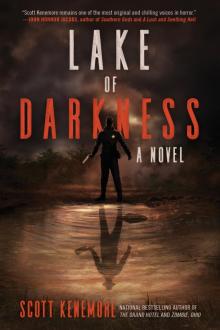 Lake of Darkness
Lake of Darkness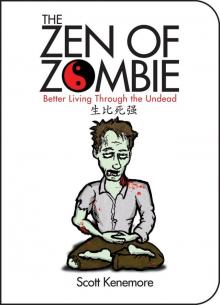 The Zen of Zombie
The Zen of Zombie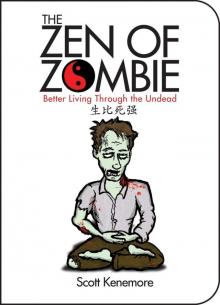 Zen Of Zombie (Zen of Zombie Series)
Zen Of Zombie (Zen of Zombie Series)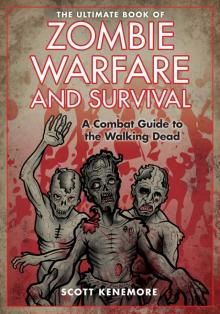 The Ultimate Book of Zombie Warfare and Survival
The Ultimate Book of Zombie Warfare and Survival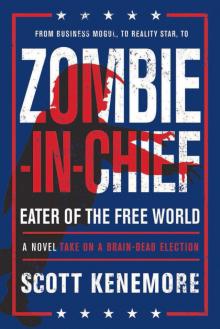 Zombie-in-Chief
Zombie-in-Chief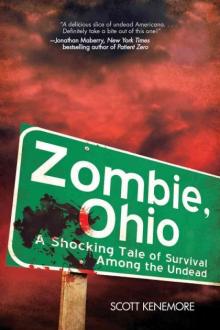 Zombie, Ohio
Zombie, Ohio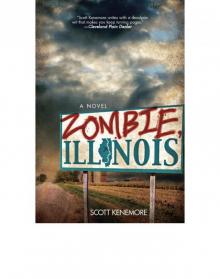 Zombie, Illinois
Zombie, Illinois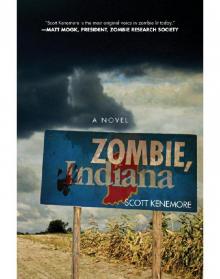 Zombie, Indiana
Zombie, Indiana